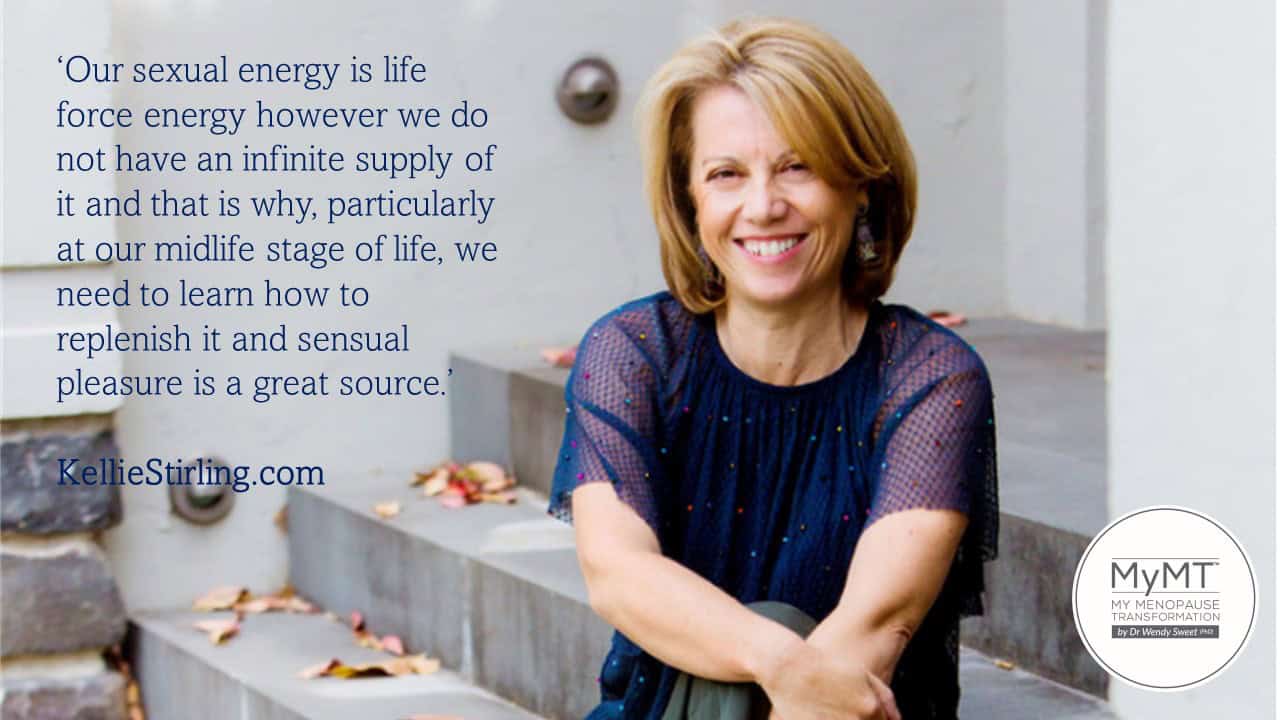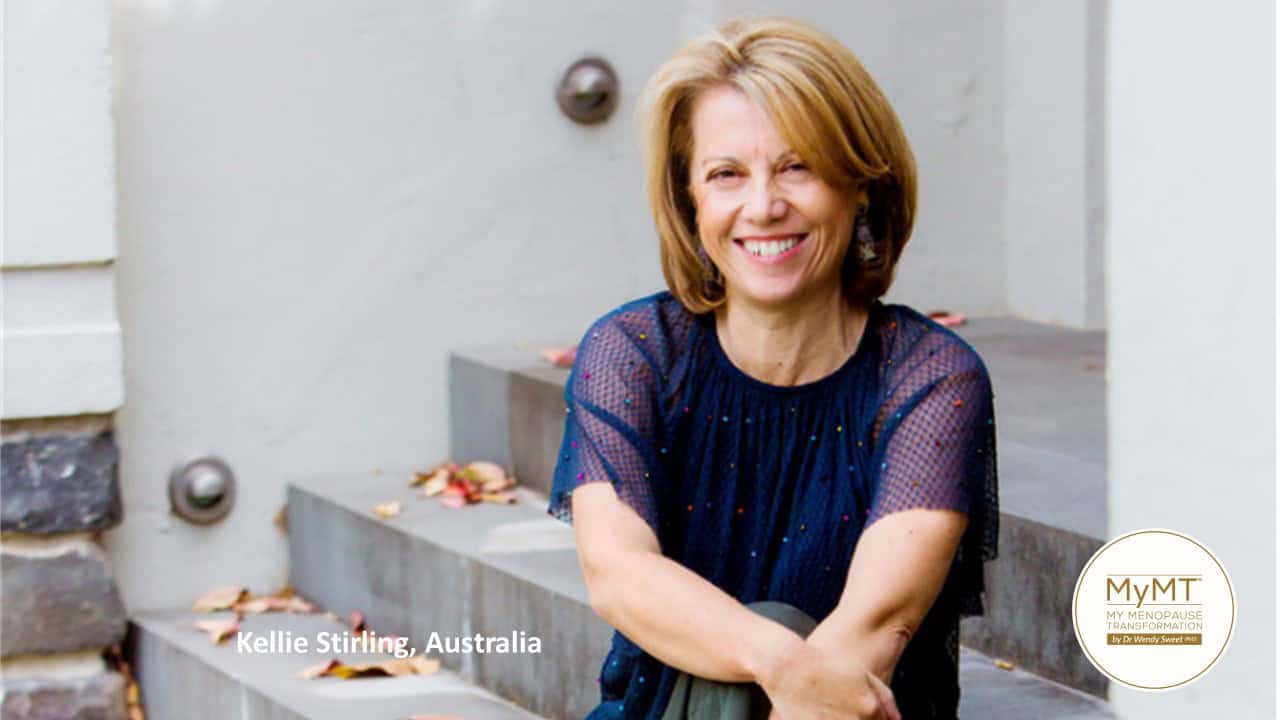I love the name of Kellie’s facebook group – “The Heroines Journey” – how apt for mid-life women!
When Kellie got hold of me to tell me how much she had enjoyed doing my programme, she also mentioned that she was a Certified Developmental Coach and VITA™ Sexuality, Love and Relationship Coach, majoring in Womens Empowerment.
I knew I had to ask Kellie to explain a little bit more to all of us about what’s really going on during menopause with our low libido, sexuality and of course, our loss of confidence. I was so excited when she said she would … so here we are, some wisdom from Kellie for you all.
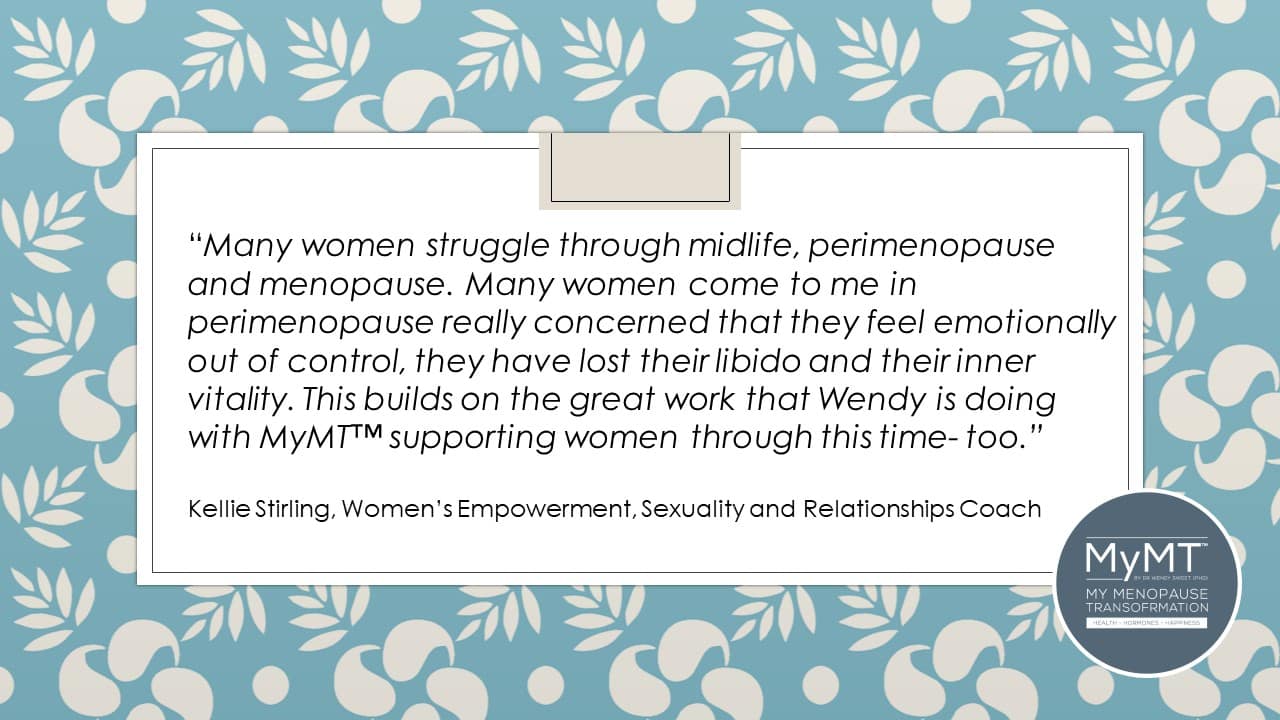
“I am a Women’s Empowerment, Sexuality and Relationships Coach. I work with women going through the big changes of motherhood, midlife and menopause. This encompasses emotional health and wellbeing, relationships and sexuality.
I have found this work is very related to MyMT™ because what Wendy has created sets a really good foundation for growing in these areas in your life.
It’s no surprise that many women struggle through midlife – their perimenopause and menopause transition. Numerous women come to me in perimenopause really concerned that they feel emotionally out of control, they have lost their libido and their inner vitality.
Firstly, I just want to say that Midlife and Menopause are two separate transitions that are intertwined with each other.
All humans experience midlife transition generally around the ages of 40 to 60 years. Menopause as you all know, is the end of our fertility. Midlife is described by James Hollis, the American psychologist, as the time when we move from our first adulthood to our 2nd adulthood.
Having been a Coach and worked in adult development for 20 years I tend to agree. Our first adulthood sits very strongly with establishing ourselves in the world, creating a family, establishing our career, buying a house. Many actions driven by our ego.
Our second adulthood is about Passion, Meaning and Purpose.
- Why am I here?
- What work is meaningful to me?
Add menopause to that mix and life becomes super interesting don’t you think?
Personally, I think this transition for women in particular is about setting yourself up well to thrive in the second half of your life, as Wendy also focuses on in her programmes.
Why does so much change and discomfort happen to us in this time our lives?
Midlife is the right time for this, because we have the life experience, wisdom, perspective and discernment to differentiate what is really going on for us.
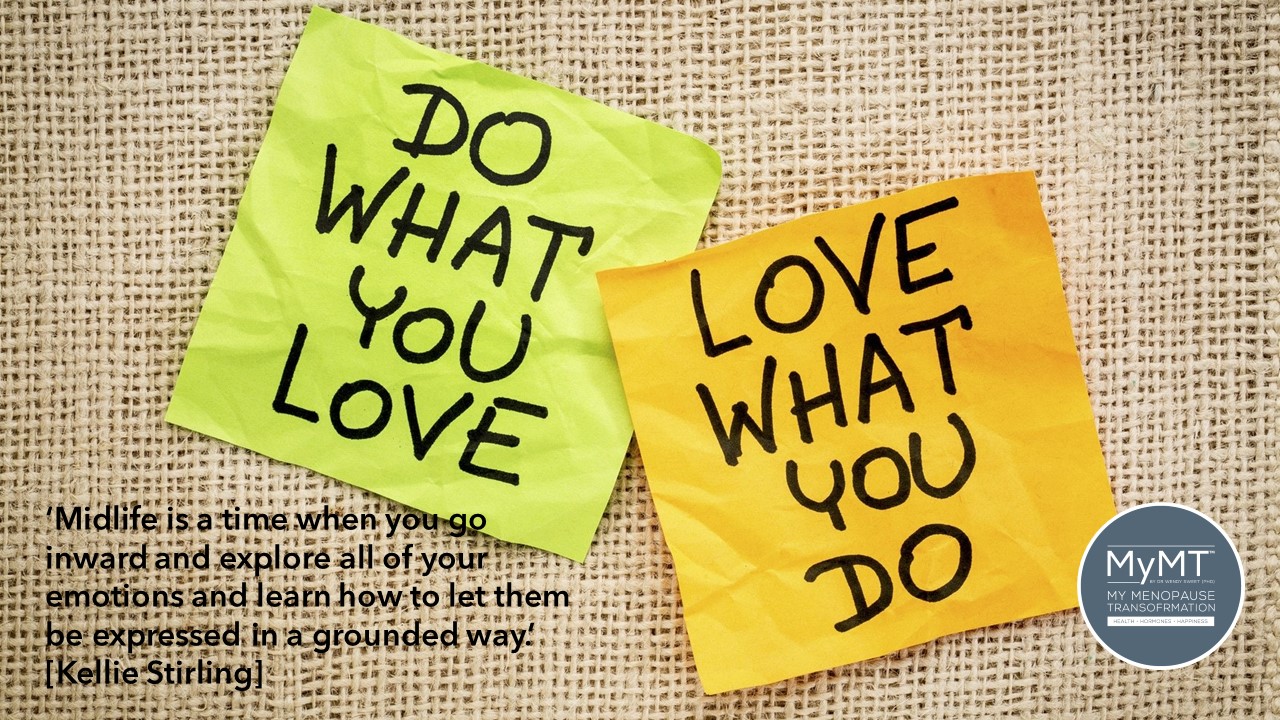
Our emotions can get really challenging in this phase because so many of us have been culturally conditioned to repress them. When we do express our emotions we are often told we are ‘too much’, or unstable hence the emotional outburst.
But your emotions are signals for action; they are supposed to be in motion.
The reason they are coming out more strongly in menopause is due to hormonal changes and the fact that your body can only hold them down for so long. It takes an incredible amount of energy for the body to repress them. Finally, your body says to you ‘enough I can’t do this any longer.’
With my clients I see this showing up in many ways – sometimes health issues, sometimes outbursts. Oestrogen is the hormone of soothing and accommodation, when it starts to decline it is like a veil is lifted and suddenly, we see situations for what they are.
That is another reason women get quite angry and frustrated at this transition.
Hence, issues that you have smoothed over and let go off in the past probably need to be rectified. Anger is a signal of boundaries being pushed and that change is required. So, you may need to reflect on,
- What are the things that are making you angry?
- What needs to change?
- Are you maybe over giving or doing too much at home?
This is why I believe that midlife is a time to go inward and explore all of your emotions and learn how to let them be expressed in a grounded way.
You will be surprised there is actually a lot of pleasure to be felt when we learn to let our ‘negative emotions’ run through. I say negative in inverted commas because that is the common misconception of this cultural conditioning I mentioned; they are in fact a natural part of the human experience.
What about our sexuality and libido?
Many women experience loss of libido at this stage or they are looking to deepen their connection with their sexuality.
Some are looking for a more sacred sexual connection with their partner. A deeper intimacy with themselves and also with their partner. A more conscious relationship maybe.
Many women just have this feeling that their sexual life could be a lot better than it is. Perimenopause gives us an opportunity to start listening to our body’s desires sexually and finding out what they are.
The rhythms of our desire change constantly throughout our life. What story have you heard about sexuality post menopause?
If it is the one that says it all goes away I want to tell you that that is an urban myth. The relationship therapist Esther Perrel says that she believes that the reason for diminishing libido in relationships is boredom or sexual needs not being met by a partner. I tend to agree with her.
But you know what? It doesn’t have to be that way at all, you can enjoy a thriving level of intimacy both with yourself and a partner well into your later years. You can absolutely rewrite your sexual story.
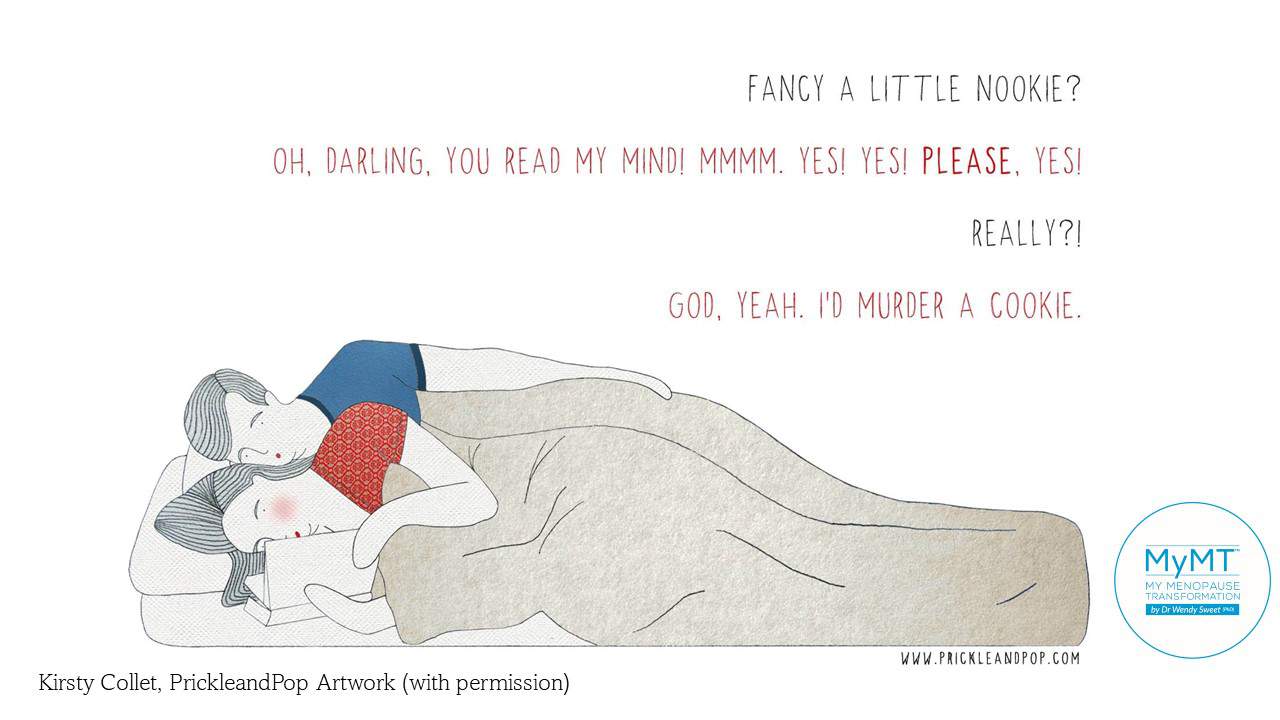
When it comes to rebuilding your relationship with your sexuality there are four really foundational pillars that support us and when I completed Wendy’s MyMT™ programme myself, I see that she sets women up well for these foundational pillars.
The four pillars are:
- Sleep
- Stress management,
- Broadening your definition of what pleasure is and,
- Connecting with your emotions.
My key question is, ‘If you are tired and stressed out who feels like Sex?’ When our body is producing stress hormones it cannot produce sex hormones. Rest is part of your erotic practice.
Our modern-day lifestyle of being “on all the time” is not good for us when it comes to pleasure in our lives. Slow is more. There is a lot to be gained from slowing down in every part of our lives. There is great joy to be experienced in the present moment. When our nervous system feels safe just to be in the moment.
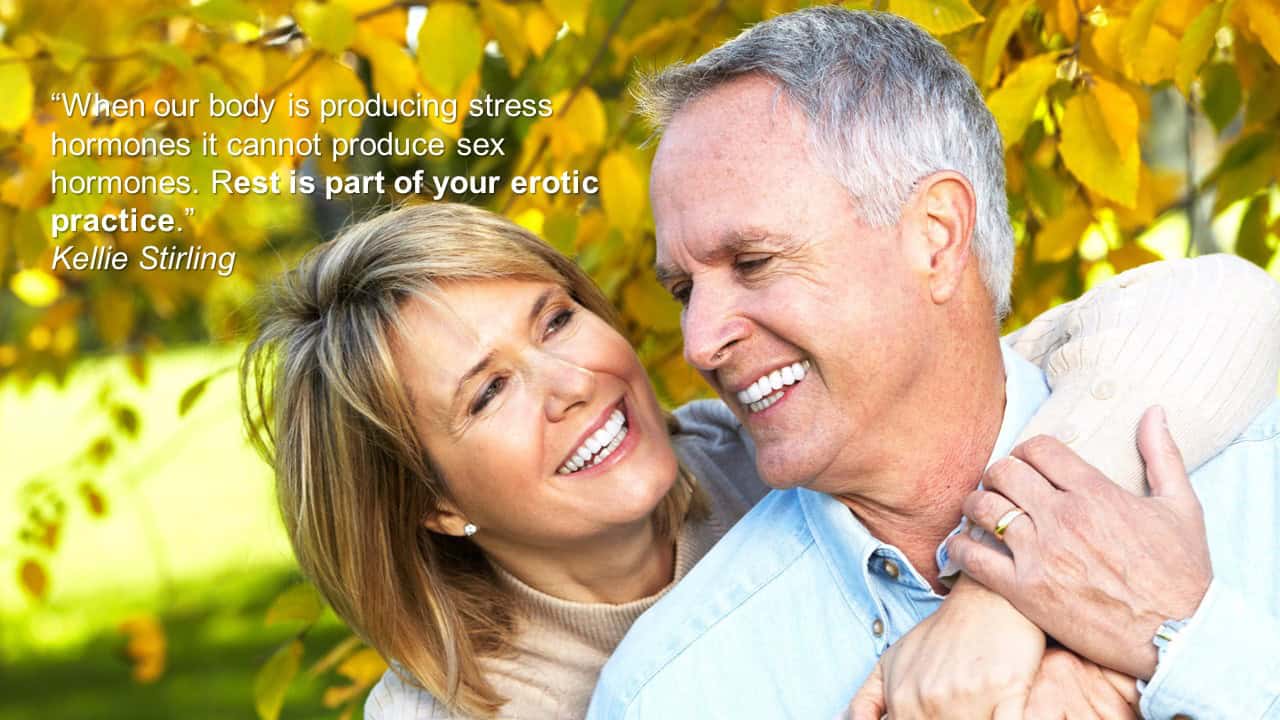
Many women have been taught that their pleasure can only occur when in relationship with another. This is untrue.
Your pleasure is for you, first and foremost.
When women expand their definition of pleasure and start to explore the many wonderful ways they can receive pleasure, their journey through midlife and menopause receives more energy and happiness. Your sensuality is a great source of pleasure to you.
Many women are triggered by the words sensuality and pleasure; this is patriarchal cultural conditioning trying to keep us down and to play small.
However, your sensuality is how you experience the world through your five senses. When it comes to pleasure, start there. The more you practice sensual pleasure this follows through to expanding your capacity for sexual pleasure in your body. Sexual pleasure is also experienced through your five senses also.
Some of my favourite sensual pleasure practices are:
- enjoying a cup of green tea,
- walking in nature,
- walking barefoot on the grass in nature,
- eating a delicious vegetable bowl for lunch,
- dancing to music – especially when I have a lot of emotional energy I need to move and doing Qi Gong.
When we do some of these things consciously with no distractions from phones, no influence of alcohol or other stimulants, we can experience incredible joy in our bodies.
Pleasure is healing and our body has a natural orientation toward pleasure and healing.
When you start to learn what really pleases you, really listening to your body, you can tell your partner. Sensual and Sexual Pleasure are nourishing to our body. Our sexual energy is life force energy however we do not have an infinite supply of it and that is why, particularly at our midlife stage of life, we need to learn how to replenish it and sensual pleasure is a great source.
Sensual pleasure is also an incredible way to ground into your nervous system and resource yourself, it will bring you calm in the moments you need it.
When I came onto Wendy’s MyMT™ programme, I learnt so much from it because Wendy has un-tangled the physiology of menopause – this sits brilliantly with my own work on the sexuality and relationship side of midlife.
As one of my pillars is sleep, I knew I needed help with this and I am now sleeping really well. I also now understand exactly what caused my night sweats. My brain fog has disappeared as well.
This was amazing as my path to starting the programme was disrupted from gut health concerns which ended up with a diagnosis of a large tumour in my colon. Four days later I found myself in for surgery. With the pandemic starting, my surgeon wanted to get me in before they shut down operating theatres.
The surgery was followed by six months of chemotherapy which for the most part went really well, despite the challenges of the treatment. All of this was a surprise to me because I’ve always been really healthy and very fit.
That’s when I started MyMT™ programme. It wasn’t long after I finished my treatment because I wanted to set myself up for good eating habits and understand the physical changes I was experiencing as the chemotherapy had put me into menopause. It was intense, but it was relatively quick.
Five months post chemo, my periods returned and I’m back to my perimenopause status and to be honest I’m really going well. I was also happy my periods returned because they are a sign of health in our bodies; some health professionals call it the sixth vital sign.
As I work with women going through the big changes of motherhood, midlife and menopause, this encompasses emotional health and wellbeing, relationships and sexuality.
I have found this work is very related and complementary to MyMT™ because what Wendy has created sets a really good foundation for growing in these areas in your life.
If you are curious to explore more you can find me on instagram @kelliestirling, my FB group is called “The Heroines Journey” and my website is www.kelliestirling.com where they are many blogs and podcasts on everything I have talked about.
Kellie, Australia
